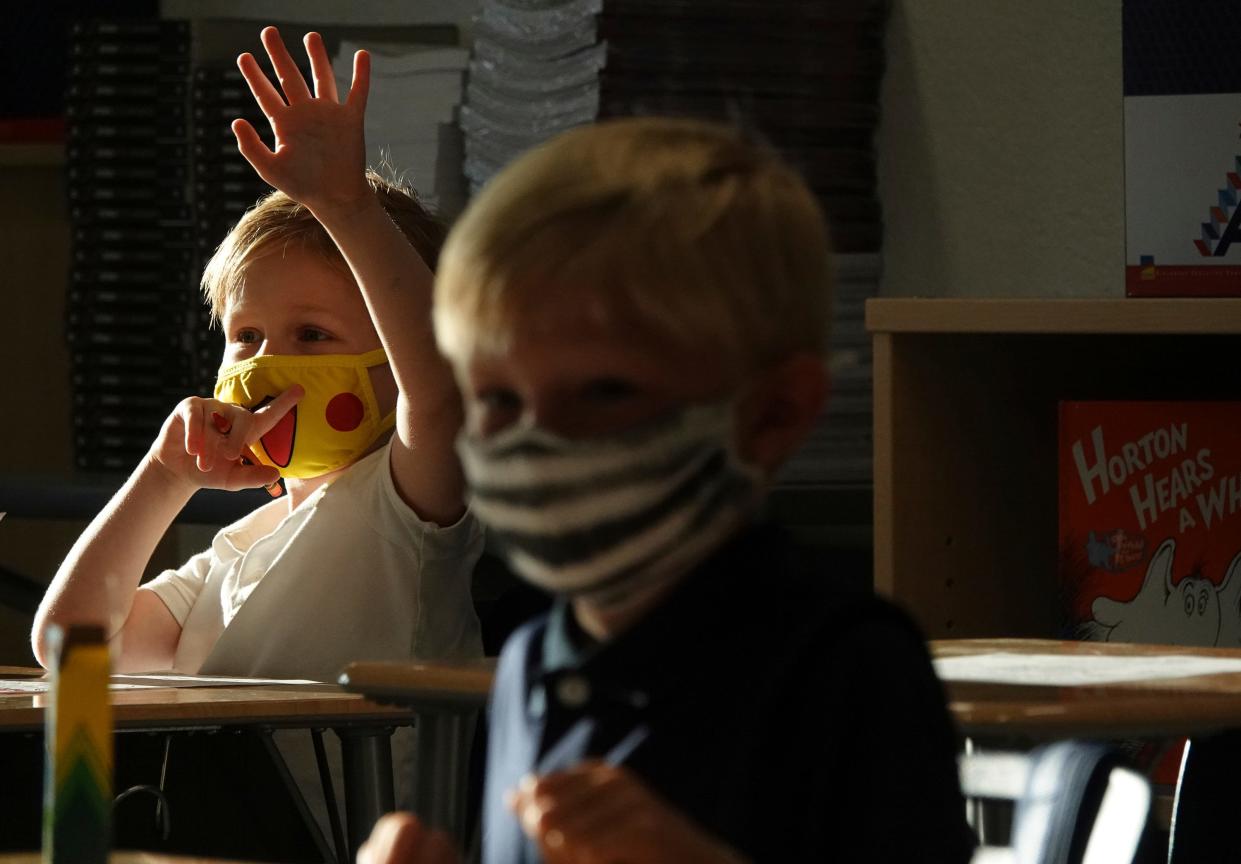COVID facts: Teachers need to tell students the truth about vaccines and masks

- Oops!Something went wrong.Please try again later.
For the past few months, we’ve debated whether teachers should be vaccinated against COVID-19 before returning to school. But I have a different question: What will they say about the subject when they get there?
My answer is simple: Teachers should share the best scientific knowledge with their students, or they shouldn’t be teachers at all.
That sounds harsh, in a nation dedicated to freedom of thought. But as the late Sen. Daniel Patrick Moynihan famously quipped, everyone is entitled to their own opinions but not to their own facts.
And the facts are clear: Vaccines help prevent the spread of COVID-19. That doesn’t necessarily mean we should mandate them, which is a political question that reasonable people can debate. But there is no real debate about whether vaccines reduce the transmission of the disease. The only question is whether our teachers will transmit that fact to their students.
USA TODAY's opinion newsletter: Get the best insights and analysis delivered to your inbox.
According to estimates by their unions, about 90% of our nation’s teachers have been vaccinated. That number is likely to rise in the next few weeks, as more and more school systems institute mandates. But with millions of public education employees, large numbers will remain unvaccinated.
Consider Davis Eidahl, a science teacher in Packwood, Iowa, where teachers can decide whether to get the COVID-19 vaccine. In a recent interview that went viral, Eidahl admitted that he hadn't received one. When he was in high school, he explained, he took a vaccine against the Asiatic flu and “got sick” from it.
Last year, Eidahl said, he taught in person and “got along real well.” True, several teachers and secretaries at his school got COVID; at the local elementary school, meanwhile, a greater number of teachers were infected. But “everyone recovered,” he said.
Nor is he afraid of harming his own students, Eidahl said. He disinfects desks in his classroom, uses hand sanitizer and wears a mask when he’s close to anyone else. He takes his cues from his daughter, a school nurse at a nearby high school, who hasn’t been vaccinated either. “She just doesn’t believe in it,” he said.
Keep falsehoods out of classrooms
That’s her right, of course. Ditto for her father, who – like any other citizen – is free to think, say and write whatever he wishes about the subject. But he has no right to spread falsehoods about it in his own classroom.
What will he say when his students ask him why he hasn't taken the vaccine? And what does he mean when he says that he and his daughter don’t “believe” in it?
If he thinks that the vaccine should not be mandated, he should be allowed to share that opinion with students – so long as he also tells them it is an opinion rather than the gospel truth. But he shouldn't be permitted to tell them that the vaccine is more harmful than COVID-19 itself, or that it doesn't slow the spread of the disease.
That's not true; it’s false. And it’s the job of our schools to teach the difference.
A history teacher can’t tell her students that the Holocaust never happened. A environmental science teacher can’t tell them that human-made climate change is a hoax. A civics teacher can’t tell them that the 2020 election was stolen. Teachers should be free to say whatever they want on these subjects when they’re outside of school. But when they're at work, they must follow what the best knowledge says.
So we shouldn’t penalize teachers who went to the U.S. Capitol on Jan. 6 to protest the election, provided that they didn’t break into the building or violate any other laws. But if they tell their class that the election was stolen, they should be fired. Period.
Share new information as science evolves
Ditto for anyone who willfully spreads falsehoods about coronavirus in schools. We don’t know everything about COVID-19; there’s a reason it’s called the “novel” coronavirus, after all. And as the science evolves, as it always does, we should share the new data with our students.
But we should never lie to them, especially on a topic as vitally important as this one. When people believe misinformation about COVID-19, they are more likely to get sick and die.
Teachers have a duty to correct the falsehoods, whether they're vaccinated or not. And if they don’t want to do that, they should find another job.
Jonathan Zimmerman teaches education and history at the University of Pennsylvania. He is the co-author (with cartoonist Signe Wilkinson) of “Free Speech: And Why You Should Give a Damn,” which was published in April by City of Light Press.
You can read diverse opinions from our Board of Contributors and other writers on the Opinion front page, on Twitter @usatodayopinion and in our daily Opinion newsletter. To respond to a column, submit a comment to letters@usatoday.com.
This article originally appeared on USA TODAY: COVID in schools: Fire teachers who don't tell truth about vaccines

